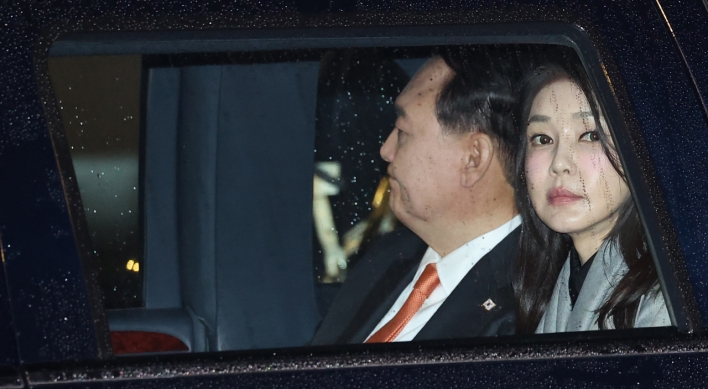Seoul officials said Sunday that the envisioned sharing of military intelligence among South Korea, the U.S. and Japan would be limited to issues concerning North Korea’s nuclear and missile programs.
Presidents Park Geun-hye and Barack Obama recognized the need for the three-way intelligence cooperation during their summit in Seoul on Friday ― a move that unnerved some Koreans, who are against any military collaboration with their onetime colonizer.
Seoul’s Defense Ministry said that it would seek to sign a memorandum of understanding for the trilateral cooperation.
Sources said the MOU was expected to be an agreement among government agencies rather than states, in an apparent move to ease critics’ displeasure over Seoul’s military cooperation with Tokyo.
“We will first hold internal inter-agency consultations over the MOU and then discuss this with the concerned countries. When we will discuss the issue with Washington and Tokyo remains unclear for now,” said a Seoul official, declining to be named.
“But when the MOU is signed by all three, it will be only about sharing intelligence on North Korea’s nuclear and missile programs.”
After the leaders agreed on the need to bolster intelligence cooperation, critics suspected that Seoul might have yielded to U.S. pressure for the trilateral security cooperation in return for Washington’s agreement to consider delaying the transfer of wartime operational control, slated for December 2015.
For Seoul, strengthened military cooperation with Washington and Tokyo is a sensitive issue as China, its strategic partner, believes that the trilateral partnership could potentially be used to keep it in check or undermine its military interests.
Seoul has also been cautious over the issue as public sentiment here has worsened amid Japan’s stepped-up claim to Korea’s easternmost islets of Dokdo and failures to fully atone for wartime misdeeds including its use of Korean women as sex slaves in frontline military brothels.
In 2012, Seoul and Tokyo sought to sign a bilateral military intelligence-sharing pact to lay the legal groundwork for expanded military cooperation, but the efforts were bogged down amid the anti-Japanese sentiment here.
Before the summit last Friday, Seoul had maintained that “proper conditions” were not forged yet to push for military intelligence cooperation with Tokyo. But after the summit, the stance appeared to have somewhat changed.
As the criticism surfaced over the trilateral intelligence cooperation, a government official stressed that public sentiment was still a crucial factor for any policy initiatives, and that it would “carefully and prudently” approach the issue.
While pushing for the so-called “rebalancing” policy toward the Asia-Pacific amid the rise of China, Washington has stressed the importance of the security cooperation with its core Asian allies of South Korea and Japan. But its efforts have floundered due to deep historical animosities between the two.
By Song Sang-ho (sshluck@heraldcorp.com)
Presidents Park Geun-hye and Barack Obama recognized the need for the three-way intelligence cooperation during their summit in Seoul on Friday ― a move that unnerved some Koreans, who are against any military collaboration with their onetime colonizer.
Seoul’s Defense Ministry said that it would seek to sign a memorandum of understanding for the trilateral cooperation.
Sources said the MOU was expected to be an agreement among government agencies rather than states, in an apparent move to ease critics’ displeasure over Seoul’s military cooperation with Tokyo.
“We will first hold internal inter-agency consultations over the MOU and then discuss this with the concerned countries. When we will discuss the issue with Washington and Tokyo remains unclear for now,” said a Seoul official, declining to be named.
“But when the MOU is signed by all three, it will be only about sharing intelligence on North Korea’s nuclear and missile programs.”
After the leaders agreed on the need to bolster intelligence cooperation, critics suspected that Seoul might have yielded to U.S. pressure for the trilateral security cooperation in return for Washington’s agreement to consider delaying the transfer of wartime operational control, slated for December 2015.
For Seoul, strengthened military cooperation with Washington and Tokyo is a sensitive issue as China, its strategic partner, believes that the trilateral partnership could potentially be used to keep it in check or undermine its military interests.
Seoul has also been cautious over the issue as public sentiment here has worsened amid Japan’s stepped-up claim to Korea’s easternmost islets of Dokdo and failures to fully atone for wartime misdeeds including its use of Korean women as sex slaves in frontline military brothels.
In 2012, Seoul and Tokyo sought to sign a bilateral military intelligence-sharing pact to lay the legal groundwork for expanded military cooperation, but the efforts were bogged down amid the anti-Japanese sentiment here.
Before the summit last Friday, Seoul had maintained that “proper conditions” were not forged yet to push for military intelligence cooperation with Tokyo. But after the summit, the stance appeared to have somewhat changed.
As the criticism surfaced over the trilateral intelligence cooperation, a government official stressed that public sentiment was still a crucial factor for any policy initiatives, and that it would “carefully and prudently” approach the issue.
While pushing for the so-called “rebalancing” policy toward the Asia-Pacific amid the rise of China, Washington has stressed the importance of the security cooperation with its core Asian allies of South Korea and Japan. But its efforts have floundered due to deep historical animosities between the two.
By Song Sang-ho (sshluck@heraldcorp.com)
-
Articles by Korea Herald



![[AtoZ Korean Mind] Does your job define who you are? Should it?](http://res.heraldm.com/phpwas/restmb_idxmake.php?idx=644&simg=/content/image/2024/05/06/20240506050099_0.jpg&u=)















![[K-pop's dilemma] Is Hybe-Ador conflict a case of growing pains?](http://res.heraldm.com/phpwas/restmb_idxmake.php?idx=642&simg=/content/image/2024/05/07/20240507050746_0.jpg&u=)